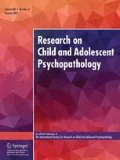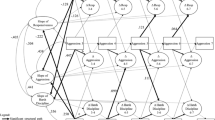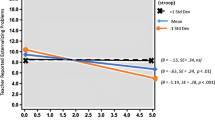Abstract
The goal of this study was to examine the links between difficult temperament (i.e., negative emotionality) and harsh parental discipline during toddlerhood, and reactive and proactive aggression in kindergarten. These links were assessed on a longitudinal population-based study of 1516 boys and girls followed longitudinally from the age of 17 months through the age of 72 months. Two possible models were tested to examine the interplay between negative emotionality and harsh parenting in predicting later reactive aggression compared to proactive aggression. The first was an additive model where both aspects make unique contributions in predicting later reactive aggression. The second model was an interactive model where harsh parenting exacerbates the link between negative emotionality and reactive aggression. Results showed a specific contribution of negative emotionality to reactive aggression. The results relative to harsh parenting are more mixed but nonetheless in line with developmental models stressing different pathways to reactive and proactive aggression.

Similar content being viewed by others
References
American Psychological Association (2002). Ethical principles of psychologists and code of conduct. Washington: American Psychological Association.
Bandura, A. (1973). Aggression: A social learning analysis. Anglewood Cliffs, NJ: Prentice-Hall.
Bandura, A. (1983). Psychological mechanisms of aggression. In R. G. Green & E. I. Donnerstein (Eds.), Aggression: Theoretical and empirical views (Vol. 1, pp. 1–40). New York, NY: Academic.
Barker, E. D., Tremblay, R. E., Nagin, D. S., Lacourse, E., & Vitaro, F. (2006). Development of male proactive and reactive aggression during adolescence. Journal of Child Psychology and Psychiatry, 47, 783–790.
Bates, J. E., Freeland, C. A. B., & Lounsbury, M. L. (1979). Measurement of infant difficultness. Child Development, 50, 794–803.
Bell, R. Q. (1968). A reinterpretation of the direction of effects in studies of socialization. Psychological Review, 75, 81–95.
Berkowitz, L. (1962). Aggression: A social psychological analysis. New York, NY: McGraw-Hill.
Berkowitz, L. (1993). Aggression its causes, consequences, and control. New York, NY: McGraw-Hill.
Boivin, M., Pérusse, D., Dionne, G., Saysset, V., Zoccolillo, M., Tarabulsy, G., Tremblay, N., & Tremblay, R. E. (2005). The genetic-environmental etiology of parents' perceptions and self-assessed behaviors toward their 5-month-old infants in a large twin and singleton sample. Journal of Child Psychology and Psychiatry, 46, 612–630.
Brendgen, M., Vitaro, F., Boivin, M., Dionne, G., & Pérusse, D. (in press). Genetic and environmental effects on reactive versus proactive aggression. Developmental Psychology.
Bushman, B. J., & Anderson, C. A. (2001). Is it time to pull the plug on the hostile versus instrumental aggression dichotomy? Psychological Review, 108, 273–279.
Campbell, A. (2006). Gender differences in direct aggression: What are the psychological mediators? Aggression and Violent Behavior, 11, 237–264.
Carrasco Ortiz, M. A., & del Barrio Gandara, V. (2006). Study on the relations between temperament, aggression, and anger in children. Aggressive Behavior, 32, 207–215.
Chang, L., Schwartz, D., Dodge, K. A., & McBride-Chang, C. (2003). Harsh parenting in relation to child emotion regulation and aggression. Journal of Family Psychology, 17, 598– 606.
Cohen, J. (1977). Statistical power analysis for the behavioral sciences. New-York: Academic Press.
Connor, D. F., Steingard, R. J., Cunningham, J. A., Anderson, J. J., & Melloni, R. H. J. (2004). Proactive and reactive aggression in referred children and adolescents. American Journal of Orthopsychiatry, 74, 129–136.
Crick, N. R., Casas, J. F., & Mosher, M. (1997). Relational and overt aggression in preschool. Developmental Psychology, 33, 579–588.
Crick, N. R., & Dodge, K. A. (1996). Social information-processing mechanisms in reactive and proactive aggression. Child Development, 67, 993–1002.
Crittendon, P. M., & Ainsworth, M. D. S. (1989). Child maltreatment and attachment theory. In D. Cicchetti & V. Carlson (Eds.), Child maltreatment: Theory and research on the causes and consequences of child abuse and neglect (pp. 432–463). New York, NY: Cambridge University Press.
Day, D. M., Bream, L. A., & Paul, A. (1992). Proactive and reactive aggression: An analysis of subtypes based on teacher perceptions. Journal of Clinical Child Psychology, 21, 210–217.
Dodge, K. A. (1991). The structure and function of reactive and proactive aggression. In D. J. Pepler & K. H. Rubin (Eds.), The development and treatment of childhood aggression (pp. 201–218). Hillsdale, NJ: Lawrence Erlbaum Associates.
Dodge, K. A., & Coie, J. D. (1987). Social information processing factors in reactive and proactive aggression in children's peer groups. Journal of Personality and Social Psychology, 53, 1146– 1158.
Dodge, K. A., Lochman, J. E., Harnish, J. D., Bates, J. E., & Pettit, G. S. (1997). Reactive and proactive aggression in school children and psychiatrically impaired chronically assaultive youth. Journal of Abnormal Psychology, 106, 37–51.
Dodge, K. A., Pettit, G. S., Bates, J. E., & Valente, E. (1995). Social informatino-processing patterns partially mediate the effect of early physical abuse on later conduct problems. Journal of Abnomal Psychology, 104, 632–643.
Dollard, D. J., Doob, L. W., Miller, N. E., Mowrer, O. H., & Sears, R. R. (1939). Frustration and aggression. New Haven, CT: Yale University Press.
Forget-Dubois, N., Boivin, M., Dionne, G., Pierce, T., Tremblay, R.E., & Pérusse, D. (submitted). A longitudinal twin study of the genetic and environmental aetiology of maternal hostile-reactive behavior during infancy and toddlerhood.
Frick, P. J., & Morris, A. S. (2004). Temperament and developmental pathways to conduct problems. Journal of Clinical Child and Adolescent Psychology, 33, 54–68.
Goldsmith, H. H. (1996). Studying temperament via construction of the Toddler Behavior Assessment Questionnaire. Child Development, 67, 218–235.
Goldsmith, H. H., Buss, K. A., & Lemery, K. S. (1997). Toddler and childhood temperament: Expanded content, stronger genetic evidence, new evidence for the importance of the environment. Developmental Psychology, 33, 891–905.
Grossman, K. E., Grossman, K., & Waters, E. (Eds.). (2005). Attachment from infancy to adulthood: The major longitudinal studies. New York, NY: Guilford.
Hemphill, S., & Sanson, A. (2001). Matching parenting to child temperament. Family Matters, 59, 42–47.
Jetté, M., & Des Groseilliers, L. (2000). Survey description and methodology: in Longitudinal Study of Child Development in Québec (ÉLEDQ 1998–2002), Québec, Institut de la Statistique du Québec, Vol. 1, No. 1.
Keily, M. K., Howe, T. R., Dodge, K. A., Bates, J. E., & Pettit, G. S. (2001). The timing of child physical maltreatment: A cross-domain growth analysis of impact on adolescent externalizing and internalizing problems. Development and Psychopathology, 13, 891–912.
Kempes, M., Matthys, W., de Vries, H., & van Engeland, H. (2005). Reactive and proactive aggression in children: A review of theory, findings and the relevance for child and adolescent psychiatry. European Journal of Child and Adolescent Psychiatry, 14, 11–19.
Ledingham, J. E. (1991). Social cognition and aggression. In D. J. Pepler & K. H. Rubin (Eds.), The development and treatment of childhood aggression (pp. 279–286). Hillsdale, NJ: Erlbaum.
Leve, L. D., Kim, H. K., & Pears, K. C. (2005). Childhood temperament and family environment as predictors of internalizing and externalizing trajectories from ages 5 to 17. Journal of Abnormal Child Psychology, 33, 505–520.
Little, T. D. (2002). Pathways of the forms and functions of aggression during adolescence. Paper presented at the biennial meeting of the International Society for Research on Aggression, Montreal, QC.
Little, T. D., Jones, S. M., Henrich, C. C., & Hawley, P. H. (2003). Disentangling the 'whys' from the 'whats' of aggressive behavior. International Journal of Behavioral Development, 27, 122–133.
Lytton, H. (1990). Child and parent effects in boys' conduct disorder: A reinterpretation. Developmental Psychology, 26, 683–697.
Merk, W. (2005). Development of reactive and proactive aggression in boys. Enschede, The Netherlands: Print Partners Ipskamp.
Muthén, L. K., & Muthén, B. O. (2006). Mplus User's Guide (Fourth Edition). Los Angeles, CA: Muthén & Muthén.
Nagin, D. S., & Tremblay, R. E. (2001). Parental and early childhood predictors of persistent physical aggression in boys from kindergarten to high school. Archives of General Psychiatry, 58, 389–394.
Oniszczenko, W., Zawadzki, B., Strelau, J., Riemann, R., Angleitner, A., & Spinath, F. M. (2003). Genetic and environmental determinants of temperament: A comparative study based on Polish and German samples. European Journal of Personality, 17, 207–220.
Orobio de Castro, B., Veerman, J. W., Koops, W., Bosch, J. D., & Monshouwer, H. J. (2002). Hostile attribution of intent and aggressive behavior: A meta-analysis. Child Development, 73, 916–934.
Paterson, G., & Sanson, A. (1999). The association of behavioral adjustment to temperament, parenting and family characteristics among 5-year-old children. Social Development, 8, 293–309.
Patterson, G. R., DeBaryshe, B. D., & Ramsey, E. (1989). A developmental perspective on antisocial behavior. American Psychologist, 44, 329–335.
Pellegrini, A. D., Bartini, M., & Brooks, F. (1999). School bullies, victims, and aggressive victims: Factors relating to group affiliation and victimization in early adolescence. Journal of Educational Psychology, 91, 216–224.
Pettit, G. S., Dodge, K. A., & Brown, B. B. (1988). Early family experience, social problem solving patterns, and children's social competence. Child Development, 59, 107–120.
Piacentini, J. C., Cohen, P., & Cohen, J. (1992). Combining discrepant diagnostic information from multiple sources: Are complex algorithms better than simple ones? Journal of Abnormal Child Psychology, 20, 51–63.
Poulin, F., & Boivin, M. (2000). Reactive and proactive aggression: Evidence of a two-factor model. Psychological Assessment, 12, 115–122.
Poulin, F., & Dishion, T. J. (2000). The peer and family experiences of proactively and reactively aggressive pre-adolescents. Paper presented at the meeting of the Society for Research on Adolescence, Chicago, IL.
Räikkönen, K., Katainen, S., Keskivaara, P., & Keltikangas-Järvinen L. (2000). Temperament, mothering, and hostile attitudes: A 12-year longitudinal study. Personality and Social Psychology Bulletin, 26, 3–12.
Rothbart, M. C., & Bates, J. E. (1998). Temperament. In W. Damon & N. Eisenberg (Eds.), Handbook of child psychology: Volume 3. Social, emotional, and personality development (5th ed., pp. 105–176). New York, NY: John Wiley.
Salmivalli, C., & Nieminen, E. (2002). Proactive and reactive aggression among school bullies, victims, and bully-victims. Aggressive Behavior, 28, 30–44.
Sanson, A., Hemphill, S. A., & Smart, D. (2004). Connections between temperament and social development: A review. Social Development, 13, 142–170.
Tremblay, R. E., & Nagin, D. S. (2005). The developmental origins of physical aggression in humans. In R. E. Tremblay, W. W. Hartup, & J. Archer (Eds.), Developmental origins of aggression (pp. 83–106). New York, NY: Guilford Press.
Vitaro, F., & Brendgen, M. (2005). Proactive and reactive aggression: A developmental perspective. In R. E. Tremblay, W. W. Hartup, & J. Archer (Eds.), Developmental origins of aggression (pp. 178–201). New York, NY: Guilford Press.
Vitaro, F., Brendgen, M., & Tremblay, R. E. (2002). Reactively and proactively aggressive children: Antecedent and subsequent characteristics. Journal of Child Psychology and Psychiatry, 43, 495–505.
Acknowledgments
This research has been made possible through grants from the Quebec Ministry of Heath and Social Services, the Quebec Ministry of Education, the Fonds Québecois pour la Recherche sur la Société et la Culture, and by the Fondation Lucie et André Chagnon. We would like to thank the Institut de la Statistique du Québec as well as the parents and teachers for their participation in this study.
Author information
Authors and Affiliations
Corresponding author
Rights and permissions
About this article
Cite this article
Vitaro, F., Barker, E.D., Boivin, M. et al. Do Early Difficult Temperament and Harsh Parenting Differentially Predict Reactive and Proactive Aggression?. J Abnorm Child Psychol 34, 681–691 (2006). https://doi.org/10.1007/s10802-006-9055-6
Received:
Accepted:
Published:
Issue Date:
DOI: https://doi.org/10.1007/s10802-006-9055-6




